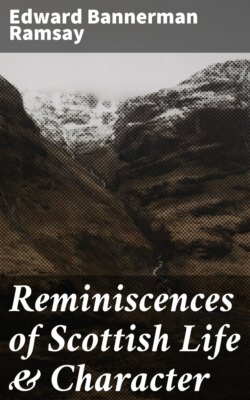Читать книгу Reminiscences of Scottish Life & Character - Edward Bannerman Ramsay - Страница 6
На сайте Литреса книга снята с продажи.
III.
ОглавлениеTable of Contents
Edward Ramsay left Somersetshire amidst the general regrets of his parishioners and neighbours, and entered on his Edinburgh career 1st January 1824. The journal which I am now using has not hitherto spoken much of the differing opinions of his brother clergymen, although there is sometimes a clergyman noted as "very low," and elsewhere, one branded as a "concealed Papist." But in Edinburgh--it is vain to conceal it--every profession must be broken into parties. He found Edinburgh, or rather I should say the Episcopal Church in Edinburgh, then theologically divided between the Evangelicals, headed by the Rev. Edward Craig and the old-fashioned Churchmen, the rather moral school, of which Mr. Alison was the distinguished ornament. Mr. Ramsay went to St. George's Chapel, York Place, as Mr. Shannon's curate, in the beginning of 1824, and remained doing that duty for two and a half years. He then went to St. Paul's, Carrubber's Close, where he laboured for a year.
In 1825 Ramsay "toiled on" with sermons and wrote a series on the Articles. "A great improvement," he says, "must have taken place in Edinburgh, for unquestionably the sermons I then got credit for we should all think little of now[9]." In 1826 he left Mr. Shannon's chapel, and took the single charge of the quaint old chapel of St. Paul's, Carrubber's Close. Amongst the events recorded of the year was the acquaintance he made by officiating at the funeral of Lady Scott, Sir Walter's wife. In 1827 he mentions a change, "a considerable move to me, which, under God, has been a good one." He closed with an offer of the curacy of St. John's, under Bishop Sandford, when he was thirty-seven years of age. In spring he was ill, and went to visit his old place and friends in Somerset.--"Interesting, very: received at my old curacy of Buckland with much joy, and on the whole enjoyed my visit." At Whitsunday 1827 he came home to enter on St. John's with Bishop Sandford, being thus half of 1827 in Carrubber's Close and half in St. John's. I was in Edinburgh then, and can well remember what general favour accompanied Mr. Ramsay in church and society. Perhaps he was not prepared for the vehemence of church dissensions among us. I do not think there was at that time so bitter war between churchmen of the same profession in England, but the Episcopal Church, of whatever section, had made great progress then in Scotland. Its fine liturgy, and more decorous ceremonial, had attracted some. Many of the heads of country families round Edinburgh have been educated in England, and many of them have married in England--both circumstances tending to keep up their attachment to the Episcopal Church; and in their houses the scholarly, accomplished, agreeable clergyman of the Episcopal Church was a welcome guest, as well as an adviser and influential friend.
In summer of 1827 the journal tells us his brother Marmaduke paid him a visit. "We read some Italian--I got a notion of Dante."
At the commencement of 1829 he enters in his journal--"This was a most important year indeed, the year of my marriage; and what event has been to me so joyful, so full of interesting recollections?" He tells that in the summer a visitor came to Scotland--a friend of Lady Dalhousie, and recommended by her to Lady Robert Kerr, at whose house they met. The lady was Isabella Cochrane, of the well-known Canadian family; writing in 1844 he says--"Fifteen years of close acquaintance with that lady have taught me the best commentary upon the Scripture declaration that a 'virtuous woman is a crown to her husband.' I need not say more than that I believe I owe mainly to her (under Providence) my comfort, success and position here. But let this suffice. None but myself can know my full obligations." Next year begins--"As 1829 gave me a wife, 1830 gave me a church, for on the 14th January Bishop Sandford died, and the whole charge was offered to me, which I undertook for three years without a curate--i.e. without a man-curate, for a most effective assistant I had in dearest Isabella, who wrote to my dictation many a weary hour."
Except a little parcel of letters touching the negotiation with Bishop Skinner, and the Aberdeen congregation in 1822, I find no letters of Ramsay till he wrote to one of the dear old friends at Frome announcing a visit with his wife.
